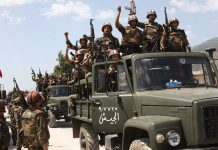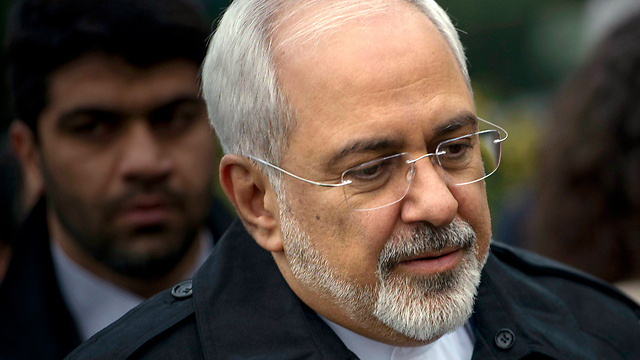Iran proposes Syrian peace plan/Syria’s Aleppo marked as international city under Iran peace plan
Roi Kais/Ynetnews/Published: 08.11.15/Israel News
Iranian foreign minister cancels trip to Turkey to discuss peace initiative to keep Assad in power; Saudi peace plan demands Iranian withdrawal. Iranian Foreign Minister Mohammad Javad Zarif’s visit to Turkey was cancelled Tuesday, when he had been expected to present the Islamic Republic’s recently developed initiative to reach a peace deal in Syria. According to reports Tuesday in al-Araby al-Jadeed, the Iranian plan would divide control in Syria between the Assad regime and rebel forces, each controlling the territories they currently hold, while Aleppo would fall under international control since it is split between the army and rebel forces.The deal also calls for cooperation between the regime and rebel forces to fight Islamic State forces and other terrorist groups. The
fight against ISIS militants would be used as a tool to unite the the country’s warring factions, and the Iranian initiative calls on rebels and regime officials to begin talks meant to result in a national unity government. While the West has often called for the removal of current President Bashar Assad as part of any peace deal, the Iranian initiative would leave the President in place, but possibly vulnerable to elections that would be monitored by international observers. The deal would also require an organized rebel leadership – a characteristic that fractured groups in opposition to Assad have struggled to form throughout the country’s four-year Civil War. Another proxy war? But Iran isn’t the only regional player that’s opened a new diplomatic front in Syria. Saudi Arabia’s Foreign Minister Adel al-Jubeir travelled to Moscow Tuesday to discuss the issues with Russian officials who have been backing the Assad regime financially, strategically and militarily. According to the Saudi peace initiative, a transitional government would be formed in Syria and Assad would be barred from any future involvement in government. Iran and Saudi Arabia are regional rivals and the two plans raise the potential for proxy-style conflict in Syria as both sides deeper their involvement after the resolution of Iran’s nuclear deal with the West.
The Saudi plan calls on Iran to remove its forces from Syria, including Hezbollah troops, saying, “Iran can’t be part of the solution because they are part of the problem.”Reuters contributed to this report.
Visiting the Vassal state…
Dr.Walid Phares/Face Book/11 August/15
Iran’s Foreign Minister Jawad Zarif visits the Lebanese Republic as a “vassal state,” the “country of Hezbollah,” with the first visit to the “emir of martyrs” Imad Mughnieh. Free for him to consider Mughnieh as a Wilaya hero, but to roam in Lebanon as if it was a Vichy country, is a direct message to Lebanese as to their state of affairs. Zarif is in charge of the foreign policies of four countries not one: Iran, Syria, Iraq and Lebanon. Can we blame Lebanese politicians for Zarif’s ballade in conquered land? Not really because it has gone too far at this point. There is nothing the “Taif political class” can do. Offering the country in 1990 to the rolling tanks of Hafez Assad was the ‘original sin.’ Everything since, with two months exceptions from March to May 2005, has been submission to the “axis.” The rest is details. Mr Zarif can stroll in the republic as the real supreme “foreign minister.” Tout vas bien madame la Marquise..
Zarif Begins Lebanon Visit, Lauds Salam’s ‘Major Role’ in ‘Stability, Anti-Terror Fight’
NaharnetAugust 11/15/Iran’s Foreign Minister Mohammad Javad Zarif began a two-day visit to Lebanon on Tuesday by meeting Prime Minister Tammam Salam. “We discussed cooperation between the two countries and bilateral ties,” said Zarif after the Grand Serail talks. “We appreciate the major role that was played by the prime minister of Lebanon to provide security, fight extremism and terror, and find cooperation among the various Lebanese parties,” the FM added. He noted that Salam’s role has led to “more calm, stability and security in this country.” Addressing the domestic Lebanese disputes, Zarif noted that “the time is not for competition and rivalry in Lebanon.”“If there should be competition, it must be over building Lebanon,” he added. “The Islamic Republic of Iran supports the Lebanese people and their demands,” Zarif went on to say. Agence France-Presse quoted an official who attended the meeting as saying that Salam and Zarif discussed Lebanon’s ongoing presidential vacuum and agreed there should be more discussion on this topic. Upon his arrival at Beirut’s Rafik Hariri International Airport earlier in the day, the minister had hoped the nuclear deal between his country and world powers would “pave the way to opening a new chapter of ties between countries in the region.” He emphasized that his talks with Lebanese officials will tackle cooperation between Beirut and Tehran. “We are in a great need of dialogue and cooperation to confront regional challenges,” added the foreign minister. Earlier, media reports said that he will stress to Lebanese officials that Tehran’s stance towards Syria and Hizbullah has not changed. Diplomatic sources told al-Joumhouria daily that Zarif would send a clear message to the parties claiming Iran will turn its back on Syria and Hizbullah that Tehran continues to back its allies in the region. Many critics have said that a nuclear deal signed between Iran and major powers in Vienna last month will lead to a change in the Iranian stance. During his two-day official visit, Zarif is also scheduled to meet with Speaker Nabih Berri, Foreign Minister Jebran Bassil and Hizbullah chief Sayyed Hassan Nasrallah. It was not clear if the Iranian Foreign Minister would also visit Free Patriotic Movement leader MP Michel Aoun in Rabieh. The July 14 deal between Iran and six world powers — the U.S., Britain, France, Russia, China and Germany — is meant to curb Tehran’s nuclear program in exchange for lifting sanctions. In addition to his talks on the deal, Zarif is expected to discuss with the Lebanese officials ways to improve bilateral economic cooperation, the sources told al-Joumhouria. They said that despite years of sanctions, Iran was able to make major progress in power production. Lebanon can benefit from Tehran in that regard, the sources added.
Zarif in Beirut, Hopes Nuclear Deal Will Lead to New Ties between Regional States
Naharnet/August 11/15/Iran’s Foreign Minister Mohammad Javad Zarif arrived in Beirut on Tuesday, highlighting the importance of coordination among the countries in the region to face challenges. He said: “We hope that the nuclear deal will pave the way to opening a new chapter of ties between countries in the region.” He made his remarks upon his arrival at Rafik Hariri International Airport on Tuesday afternoon. He emphasized that his talks with Lebanese officials will tackle cooperation between Beirut and Tehran. “We are in great need of dialogue and cooperation to confront regional challenges,” added the foreign minister. Earlier, media reports said that he will stress to Lebanese officials that Tehran’s stance towards Syria and Hizbullah has not changed. Diplomatic sources told al-Joumhouria daily that Zarif will send a clear message to the parties claiming Iran will turn its back on Syria and Hizbullah that Tehran continues to back its allies in the region. Many critics have said that a nuclear deal signed between Iran and major powers in Vienna last month will lead to a change in the Iranian stance. During his two-day official visit, Zarif is scheduled to meet with Speaker Nabih Berri, Prime Minister Tammam Salam, Foreign Minister Jebran Bassil and Hizbullah chief Sayyed Hassan Nasrallah. It was not clear if the Iranian Foreign Minister would also visit Free Patriotic Movement leader MP Michel Aoun in Rabieh. The July 14 deal between Iran and six world powers — the U.S., Britain, France, Russia, China and Germany — is meant to curb Tehran’s nuclear program in exchange for lifting sanctions. In addition to his talks on the deal, Zarif is expected to discuss with the Lebanese officials ways to improve bilateral economic cooperation, the sources told al-Joumhouria. They said that despite years of sanctions, Iran was able to make major progress in power production.
Lebanon can benefit from Tehran in that regard, the sources added.






















